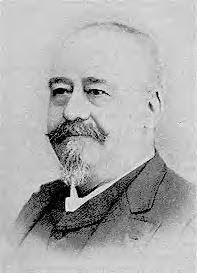 Gospel song composer and compiler John Robson Sweney was born on this day in 1837 in West Chester, PA (near Philadelphia). He first taught music in Dover, Delaware, and during the Civil War he served as the band leader of the Third Delaware Regiment.
Gospel song composer and compiler John Robson Sweney was born on this day in 1837 in West Chester, PA (near Philadelphia). He first taught music in Dover, Delaware, and during the Civil War he served as the band leader of the Third Delaware Regiment.After the war, he became the professor of music at the Pennsylvania Military Academy (now Widener University) in West Chester for more than 25 years, also serving as music director of the Bethany Presbyterian Church for several years during that time. The Sunday School at Bethany was a model institution that many churches followed; its superintendent was John Wanamaker, of the famous Philadelphia department store. Sweney was the song leader, and with Wanamaker's support, he soon found himself asked to lead the music at many summer revival assemblies around the country.
He originally composed secular songs, but after 1871 his music was primarily written for sacred texts. Often collaborating with fellow Pennsylvanian William J. Kirkpatrick, he worked on the compilation of approximately sixty collections of Sunday School and gospel songs, most published by the Philadelphia firm of John J. Hood. Nearly all the leading song writers of the day are represented in those books, and Sweney is credited with "discovering" several of them, by first publishing their work and often writing music for their texts. In one of the collections, Our Sabbath Home (1884) there is a tune credited to his daughter Josephine, "aged 4," though I have yet to find any evidence that she continued to compose in her more advanced years.
A few of Sweney's songs are still sung today, but they were much more popular in the late nineteenth and early twentieth centuries. Many were recorded in the early days of sound technology. One of his frequent collaborators was Fanny Crosby, and this Christmas song (you knew we were getting around to this) was first published in Radiant Songs (1881).
The evergreen branches are waving around us,
And sweetly our carols in harmony sound,
While here we are gathered to welcome with rapture
The birth of our Savior, in Bethlehem found.
Refrain
Hark! the music of the angels
Floating onward still we hear;
Blessèd music, sweetest chorus
Ever sung to mortal ear.
How graciously favored the shepherds of Judah,
Who guarded their flocks on that wonderful morn,
When legions descended, proclaiming the tidings
That Jesus, the promised Redeemer, was born.
Refrain
How humble his birthplace, how lowly his cradle,
O tender compassion, O infinite love!
The Child of the Highest our nature assuming
That we might inherit the mansions above.
Refrain
The sweet chiming bells with our carols are blending,
A glad, merry Christmas they joyfully ring.
While here we are gathered to welcome with rapture
The birth of our Savior, Redeemer, and King.
Refrain
Fanny Crosby, 1881; alt.
Tune: EVERGREEN (12.11.12.11. with refrain)
John R. Sweney, 1881
Among Fanny Crosby's thousands of gospel songs, you might correctly imagine that some of them were written for Christmas. These are only a handful:
The Angel's Proclamation
In a lowly manger sleeping
Merry, merry chiming bells
Never shone a light so fair
One Year Ago: Its Onward Course Has Run (more Fanny)























